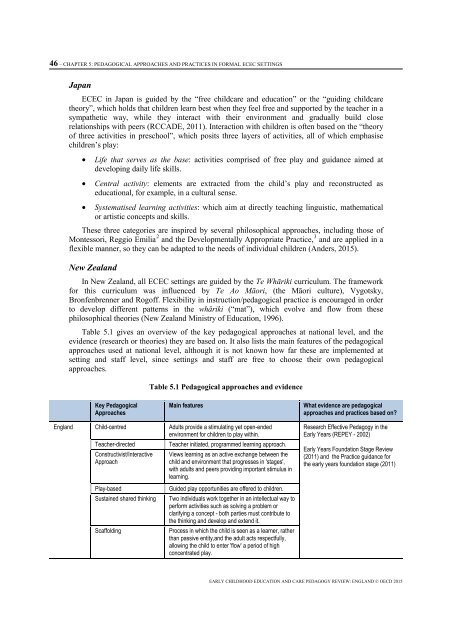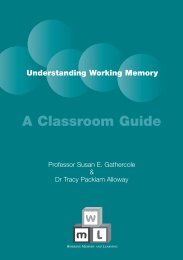early-childhood-education-and-care-pedagogy-review-england.pdf?utm_content=bufferb49b1&utm_medium=social&utm_source=twitter
early-childhood-education-and-care-pedagogy-review-england.pdf?utm_content=bufferb49b1&utm_medium=social&utm_source=twitter
early-childhood-education-and-care-pedagogy-review-england.pdf?utm_content=bufferb49b1&utm_medium=social&utm_source=twitter
You also want an ePaper? Increase the reach of your titles
YUMPU automatically turns print PDFs into web optimized ePapers that Google loves.
46 – CHAPTER 5: PEDAGOGICAL APPROACHES AND PRACTICES IN FORMAL ECEC SETTINGSJapanECEC in Japan is guided by the “free child<strong>care</strong> <strong>and</strong> <strong>education</strong>” or the “guiding child<strong>care</strong>theory”, which holds that children learn best when they feel free <strong>and</strong> supported by the teacher in asympathetic way, while they interact with their environment <strong>and</strong> gradually build closerelationships with peers (RCCADE, 2011). Interaction with children is often based on the “theoryof three activities in preschool”, which posits three layers of activities, all of which emphasisechildren’s play:• Life that serves as the base: activities comprised of free play <strong>and</strong> guidance aimed atdeveloping daily life skills.• Central activity: elements are extracted from the child’s play <strong>and</strong> reconstructed as<strong>education</strong>al, for example, in a cultural sense.• Systematised learning activities: which aim at directly teaching linguistic, mathematicalor artistic concepts <strong>and</strong> skills.These three categories are inspired by several philosophical approaches, including those ofMontessori, Reggio Emilia 2 <strong>and</strong> the Developmentally Appropriate Practice, 3 <strong>and</strong> are applied in aflexible manner, so they can be adapted to the needs of individual children (Anders, 2015).New Zeal<strong>and</strong>In New Zeal<strong>and</strong>, all ECEC settings are guided by the Te Whāriki curriculum. The frameworkfor this curriculum was influenced by Te Ao Māori, (the Māori culture), Vygotsky,Bronfenbrenner <strong>and</strong> Rogoff. Flexibility in instruction/pedagogical practice is encouraged in orderto develop different patterns in the whāriki (“mat”), which evolve <strong>and</strong> flow from thesephilosophical theories (New Zeal<strong>and</strong> Ministry of Education, 1996).Table 5.1 gives an overview of the key pedagogical approaches at national level, <strong>and</strong> theevidence (research or theories) they are based on. It also lists the main features of the pedagogicalapproaches used at national level, although it is not known how far these are implemented atsetting <strong>and</strong> staff level, since settings <strong>and</strong> staff are free to choose their own pedagogicalapproaches.Table 5.1 Pedagogical approaches <strong>and</strong> evidenceKey PedagogicalApproachesMain featuresWhat evidence are pedagogicalapproaches <strong>and</strong> practices based on?Engl<strong>and</strong> Child-centred Adults provide a stimulating yet open-endedenvironment for children to play within.Teacher-directedTeacher initiated, programmed learning approach.Constructivist/InteractiveApproachPlay-basedSustained shared thinkingScaffoldingViews learning as an active exchange between thechild <strong>and</strong> environment that progresses in 'stages',with adults <strong>and</strong> peers providing important stimulus inlearning.Guided play opportunities are offered to children.Two individuals work together in an intellectual way toperform activities such as solving a problem orclarifying a concept - both parties must contribute tothe thinking <strong>and</strong> develop <strong>and</strong> extend it.Process in which the child is seen as a learner, ratherthan passive entity,<strong>and</strong> the adult acts respectfully,allowing the child to enter 'flow' a period of highconcentrated play.Research Effective Pedagogy in theEarly Years (REPEY - 2002)Early Years Foundation Stage Review(2011) <strong>and</strong> the Practice guidance forthe <strong>early</strong> years foundation stage (2011)EARLY CHILDHOOD EDUCATION AND CARE PEDAGOGY REVIEW: ENGLAND © OECD 2015



